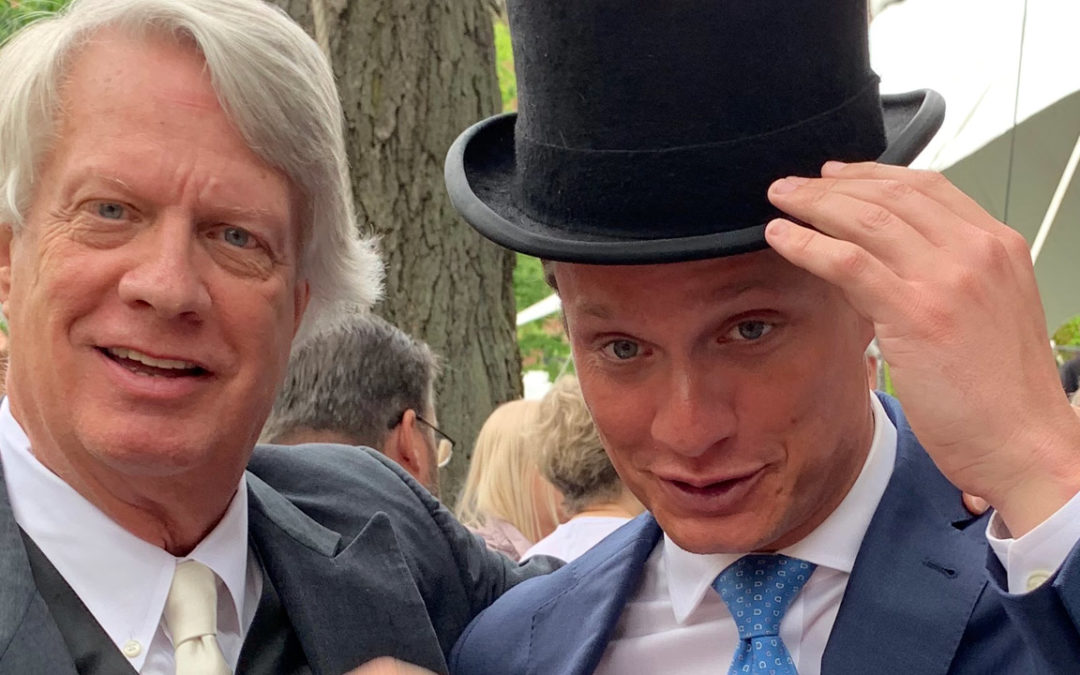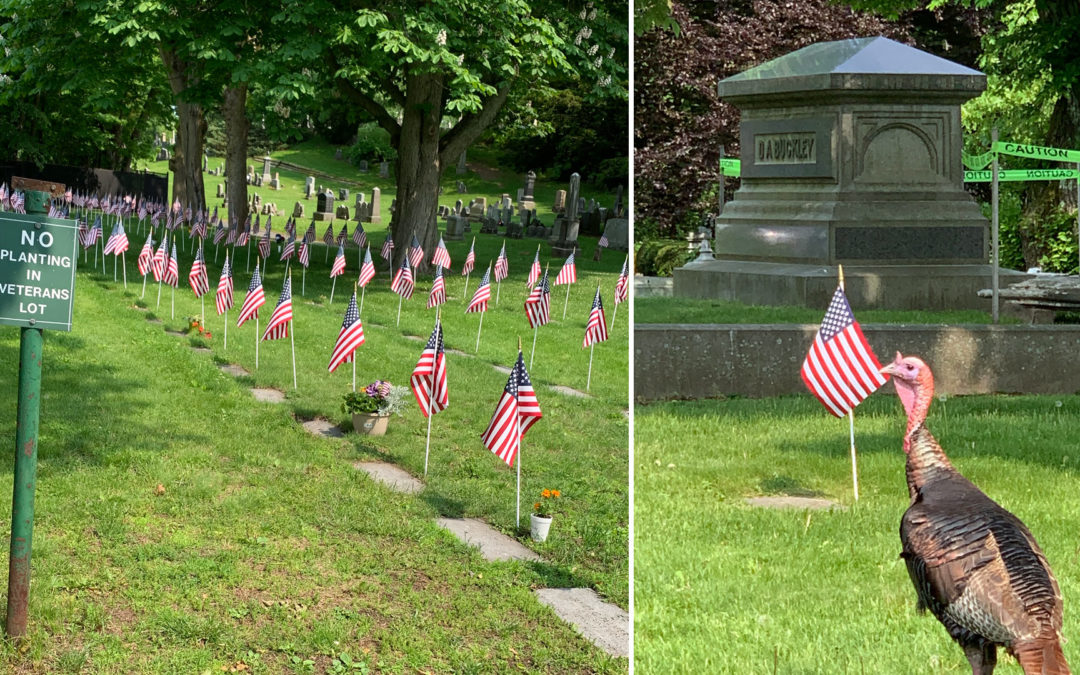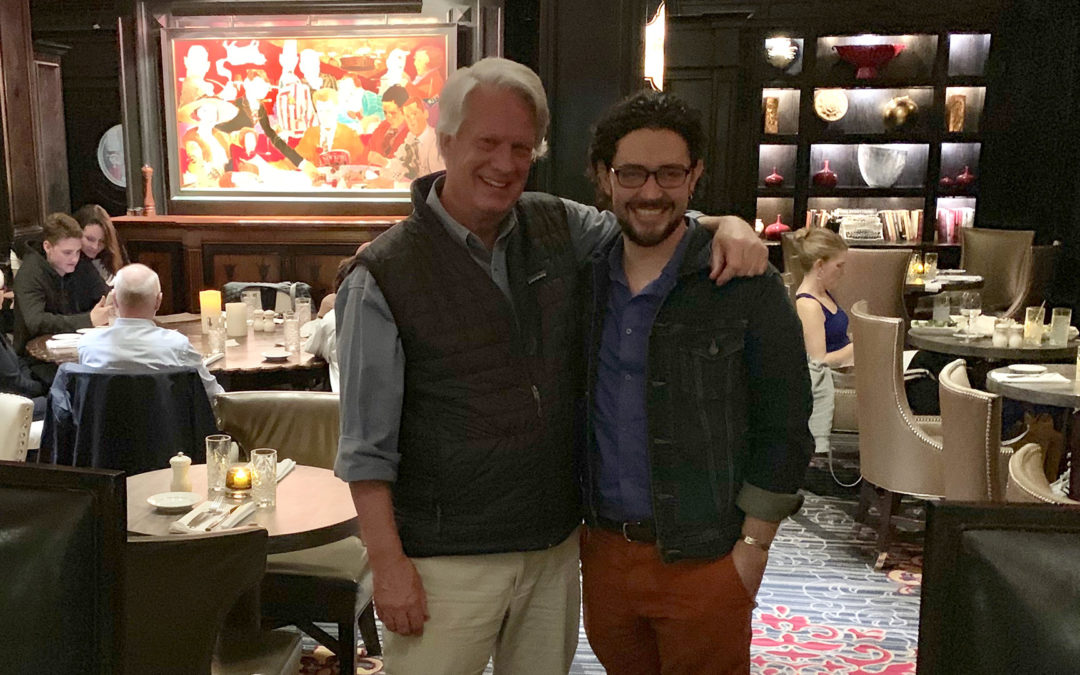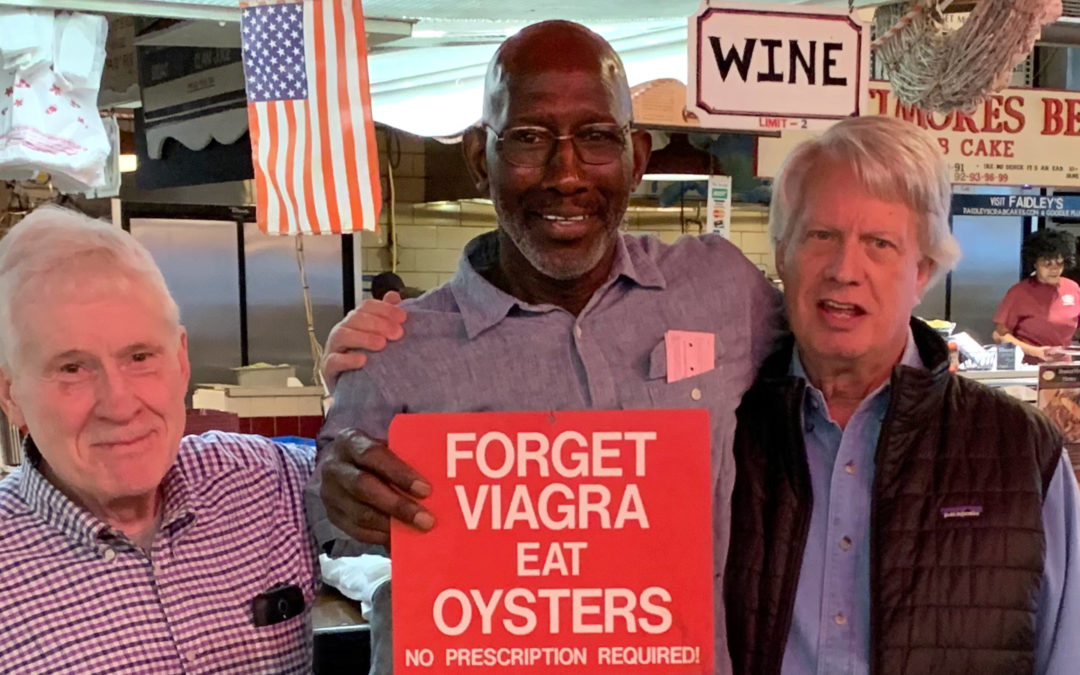
by Robert Bowie, Jr. | Jun 25, 2019 | Featured, HAA, Personal
For me, the “future” is like a churning cement truck going to a job. The “present” is the dump of the watery mixture and its slow and permanent hardening. The “past” are the hardened roads I travel on again and again and again. Only the gift of “accident” can break apart all three and only with “creativity” do I become released and reborn to grow into a maturing perspective.
Over the last six years, I have been chosen to help The Alumni Association at Harvard put on graduation. I look forward to this and accept with pleasure each year when it is offered. I dress up in a silly top hat and tails to escort the honorary degree recipients and their families at Harvard’s graduation. It is an unusual and informative experience.
Rick, my son, and I are very close. After graduating from Dickinson College, his high school asked him to return to Baltimore to teach and help coach their football program. During these years Rick continued his commitment to education by getting a Master’s Degree from the night school at Johns Hopkins University, which allowed him only one night a week free. During these years Rick and I had dinner together every Monday night.
Rick has always been a very kind and socially conscious person. Rick also has an encyclopedic understanding of football and its rules and strategy. Because there is a deep divide in the opportunities provided in our city, after several years of teaching and coaching at his private high school, Rick elected to join his former head coach and teach at Saint Frances Academy in downtown Baltimore.
The year before Rick joined this school, it had only won one game. The next year, they were undefeated. The following year, they were ranked fourth in the nation.
All of the students on the football team went on to established and respected universities with mostly full scholarships. Rick told me several times that they were the most committed group of young men he had ever met. The school is located in the shadow of the penitentiary.
Rick continued his commitment to both education and football by accepting a graduate assistant position at the University of West Virginia, then followed his coach to the University of Houston. The last two years he has been working 24/7 as a GA for University of Houston’s football team and I never see him anymore.
So those are my hardened roads leading up to this year’s Harvard graduation. Here comes the cement truck: The week before my graduation duties this year, Rick called and said he had a free week. I wanted to see him desperately but I had made my commitment months ago. I asked him, “Do you want to come to Boston?” I couldn’t think of anything more boring for him but he said, “Sure.”
Was this a disaster about to happen or was this a gift of an accident? Rick would not know anybody…
We did everything together. A wonderful lunch with Rick and Lindsey Shepro and John Bowman at B&G oysters (Boston’s best oysters), and a dinner after graduation with Sam and Wendy Plimpton at No.9 Park (Boston’s best restaurant).

It is not easy to be shocked as you watch your child become, before your eyes, more sophisticated than you are. My old friends became his new friends almost instantly. And then we slipped back to our welcome past and beer and a Bruins game on TV and a Red Sox game at Fenway… and a stunning and subtle speech by Angela Merkel in the afternoon of graduation.
So often now, as I become older and easily set in my ways, I look for the gift of the “accident.” It breaks my safe world apart. From broken expectations comes the unexpected rebirth.

by Robert Bowie, Jr. | Jun 18, 2019 | Featured, Personal
I’m extremely fortunate to have had a class with Elizabeth Bishop, who was one of our great, late 20th Century poets. She taught us that any two poems, no matter where they are from, when placed side-by-side will cause an unintended contrast that will illuminate both. Once grasped, this is an eye-opening idea with endless potentiality for creative thought.
I grew up between two schools, two cemeteries, and Harvard Square. The Cambridge cemetery was relatively flat, had few trees, was wide open, and pretty much existed to hold the military dead of foreign wars and the citizens of that city. In contrast, behind the impenetrable black iron fence and gate of Mount Auburn Cemetery, spread a small and elite universe of acres of hills and valleys with shaded walkways and still ponds, as an arboretum of carefully preserved trees and as an aviary for local and migrating birds. These two cemeteries existed side by side divided only by a single two lane road.
As children we would freely ride our bikes among the military dead in the Cambridge cemetery but we were strictly prohibited from even entering Mount Auburn. It wasn’t a place designed for us. However, when the gates were open adults were permitted to walk among the graves and in its verdant splendor. Mount Auburn rested like a shared understanding of what a patrician heaven might be while the Cambridge Cemetery was a plebeian limbo.
When I visited after last Memorial day the Cambridge cemetery had rows and rows of flags. One at each grave. No one was there except a lone bagpiper striding along one of the empty roads. Unexpectedly, I could find only one flag in all of Mount Auburn and it was guarded by a wild turkey that had become domesticated by the place. There was a quiet urgency as groups of horticulturalists or birdwatchers clustered as they whispered observations to each other.
Miss Bishop, as she called herself, was right. The accident of the unintended contrasts caused by my time and location that day opened up worlds for me about the two cemeteries, about the living generation and the predeceased, as I walked between the four.

by Robert Bowie, Jr. | Jun 11, 2019 | Operetta
After 80 pages of wonderful foolishness, rhymes & hip-hop, we are on track for operetta submissions by September 1st. Christian De Gré Cardenas and I have set August 10–17 to retreat to Mexico to complete The Voice of the People, our operetta about the seventh of the Seven Deadly Sins — pride.
Is it wrong to say I’m proud?
Last Friday, Patrick Alberty, Christian and I met to go over my most recent draft and we are all excited and happy about our progress. Our target is to have a commitment and opening next spring or summer.
by Robert Bowie, Jr. | May 21, 2019 | HAA, Poetry
Last week I presented my ode for the Harvard Alumni Association to keep them laughing. As the Poet Laureate, I love doing this every year. This year, the subject was Harvard Magazine, and my ex-father-in-law, both of which I love.
For Harvard Magazine
(Portrait of Gentleman Jim)
By Robert R. Bowie, Jr. Ab’73
Whenever I became too confident
Of my perfect Harvard education
My ex-father-in-law, concomitant,
Was there to deliver expiation.
His timing was perfect. He’d watch and wait.
He’d set me up and then he’d set me straight.
Let me describe this kind and gentle man:
In profile he was blessed with a perfect
Semi-circular belly and no can.
Perfect as a backlit window silhouette:
A photo I still love and regret.
A photo my ex-wife wouldn’t forget.
A small piece of a small, but sad divorce.
He has ‘passed on’ but I miss the man.
Comfortable with himself. Steady. On course.
Leaning back with a scotch glass in his hand,
“I sell seeds and satisfy farmers’ needs,
Go to church, plant the garden, pull the weeds.”
Every Easter the two of us would go
Outside to smoke illegal Cuban cigars.
He’d get me to tell him what he should know.
He’d always wait until I’d gone too far.
He’d lean back: “Ahh, hoist by your own petard?”
Flick off his ash and say “Harvard-smavard.”
They’re all gone now, his wife, mine and him.
But still up until the very end
I would package and carry up to him
All my old Harvard Magazines and then
He always put them there in the same place,
Next to the kindling and fireplace.
I drove up a month or so before he died.
He so deeply missed his loving wife.
The reconciliations I had tried
Had failed. Love was leaking out of his life.
The door unlocked, sleeping in his chair
With a Harvard Magazine spread out there
Heaving on his perfect snoring belly,
What a perfect find was all of this?
There was food in the ice box from the deli.
I found whiskey and two glasses. I kissed
Him and asked “What’s this you’re reading you fool?”
With a cagey smile: “It ain’t that bad a school.”
Copyright © 2019

by Robert Bowie, Jr. | May 7, 2019 | Featured, Law, Personal
Several years ago Professor Mike Millemann, on the left, contacted me to see if I wanted to help him fulfill a grant made to the University of Maryland Cary School of Law to teach law differently by using the theater.
We signed up Elliot Rauh, of Single Carrot Theatre and decided the class should write plays about prisoners who had been released from prison after they had been determined to be absolutely innocent after years of incarceration. One of those plays was about Michael Austin, at the center, who was imprisoned in Maryland for over 27 years for a murder he did not commit. He was freed through the brilliant legal work of Larry Nathans, Esq., of Nathans & Biddle.
Last week we got together again at Lexington Market in downtown Baltimore as a reunion of old friends to help Michael because Michael had just found out that due to a typo in his arrest record he was never exonerated and that has kept him from getting work. This will be resolved but the reunion between friends nonetheless was wonderful.
In Michael’s case, and in most of the cases that we turned into plays, the process was remarkably similar. On the first day of class we brought Michael in to meet the class and answer questions. He was calm, collected, and despite the injustice of his incarceration not angry but very wise. In prison he had perfected himself and along the way he had become quite a remarkable musician.
Throughout the following weeks of the semester, the first third of the class was used to do deep research on what went wrong and what led to his conviction. The class went through trial transcripts, records of an incompetent defense lawyer, and files of prosecutors that withheld evidence and a transcript recording of the judge that sentenced an innocent man to life in prison.
The second third of the class the students wrote the backstory, and in the third and final part of the class, Elliot Rauh taught acting and turned inexperienced law students into the actors of their own play which was performed before the law school.
Michael stayed with the class from the beginning. One of the students said that he should provide music for the play and he agreed. Another one of the students suggested that at the end of the play, Michael should leave his instruments behind and identify himself as the Michael Austin about whom the play was written. The audience gasped and some wept.
At first I thought this class might have limited value so we asked that the students provide a one minute clip to the people who had provided us the grant to state whether they thought the grant money had been used appropriately. I became convinced when one student faced the camera and said “I wrote the part of a defense lawyer who was unprepared, acted the part of the prosecutor who withheld the time card that would have exonerated him, and read the exact words 30 years ago when an innocent man was pronounced guilty by a state court judge in the circuit court of Baltimore city and sentenced to life and I have never been in a courtroom.”
At that point we were convinced that the class worked. People were learning from mistakes made before they were fatal. We taught the class for seven years and it was ranked as one of the most appreciated classes at the law school during that time.





